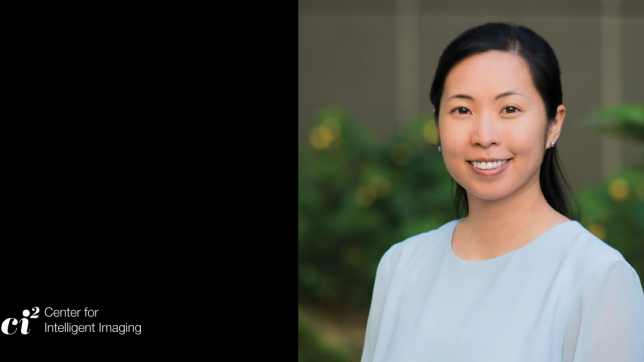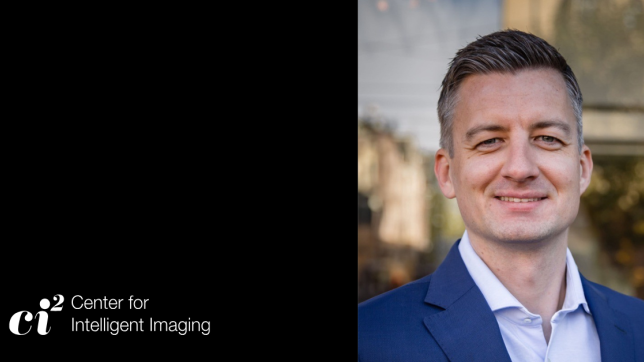Each year, the University of California, San Francisco's Department of Radiology and Biomedical Imaging and Center for Intelligent Imaging (ci2) welcomes summer interns into the department to expand on their research, expertise and critical thinking when utilizing artificial intelligence in medical imaging.
July 31 is National Intern Day, a day when young students in the department are highlighted for their work and early academic careers. Koharu Sakiyama is a rising senior at the University of California, Berkeley, majoring in Molecular and Cell Biology and minoring in Data Science. Jae Ho Sohn, MD, MS, is her faculty mentor and principal investigator guiding her interdisciplinary research.
"Our main goal is to improve radiological communication in the clinical setting by developing a large vision language model-based framework," Sakiyama says. The AI-assisted framework can help bridge the gap for patients not able to meet with their physician after receiving medical information. This is crucial for patients to not only adhere to treatment plans but also to have a clear understanding of their medical information. "Improved communication in the clinical setting can help patients make informed decisions, reduce anxiety, and foster stronger collaboration between patients and healthcare providers," she explains.
Sakiyama's interest in AI in medical imaging first came about while doing coursework in computer science and programming. "That's when I really got into ... the thinking process involved with doing programming and computational work, and I became more interested in how that could be used in the research setting with medical goals," Sakiyama says. Her previous internship at Oregon Health and Science University primed her for her time at Ci2 and deepened her knowledge of AI in clinical settings.
The capabilities of AI in healthcare settings are seemingly endless. "What excites me most about this field is its potential in being able to assist in so many different areas of healthcare, especially as we get more data sets and more advancements in accuracy of various tasks like treatment planning or diagnosis. Ultimately, a more personalized approach to medicine is a key goal of the integration of AI, hopefully, into the clinical workflow," Sakiyama says.
With all the research and advancement, ethical considerations must be taken into account when interacting with AI systems. Sakiyama says AI is a tool, not a replacement for medicine or clinical experts. It is important to develop these systems in a way that complements existing methods, while also taking necessary steps to minimize potential biases that could be incorporated during their development.
None of Sakiyama's research or advancements would have come without her mentor and biggest influence, Dr. Sohn. His interdisciplinary background of being a clinician, coupled with his lab that's working with AI and machine learning in the healthcare setting, has greatly furthered her learning experience at Ci2. "His entire team has a lot of collaborative nature. We have various medical students, residents, physicians themselves, also in the lab, doing research with us, which makes this whole process really interdisciplinary and brings a lot of different perspectives that I think is harder to get in a pure technical lab," Sakiyama says of Dr. Sohn. "He's also very, very supportive of all of the different pathways that our current lab members are trying to pursue. Spending my summer in this lab has been an invaluable learning experience, and I'm very grateful to both Jae and all of the lab members who have provided so much support, as well as the Ci2 program for this opportunity."
As for her future, Sakiyama's time at Ci2 has solidified her love of research. "I would really like to pursue a PhD that's related to computational medicine, or improving personalized medicine with the use of these tools," she says. Sakiyama recommends finding a lab of interdisciplinary scientists, physicians and researchers as the best way to explore this kind of research for incoming interns and medical students. "Finding a lab, like the Jae Ho Sohn lab, where you can work alongside medical professionals, is really helpful in understanding not just, 'Oh, here's a problem that we want to tackle', but 'how is that going to actually impact the clinicians or the patients?' These perspectives allow our research to be better informed on how we can make these models more accurate or realistic to ensure feasibility in the clinical setting," Sakiyama says.
Join UCSF Ci2 in welcoming Koharu Sakiyama, along with Harsh Tripathi and Anoushka Shah, to the Ci2 team this summer and celebrating National Intern Day!



